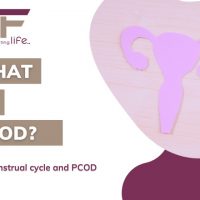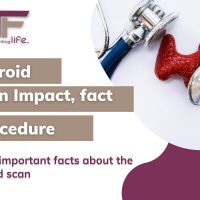CContents
Menstrual irregularities in PCOD
Ovulation infertility is most commonly caused by Polycystic Ovarian Disease (PCOD). Menstruation irregularity or absence is a quintessential and important characteristic of PCOD. Many women with PCOD experience abnormal periods as a result of hormonal imbalances.
Each month, the ovaries generate a developed follicle for fertilisation. Due to PCOD’s hormonal instability, the follicle never fully develops or is discharged. The follicle does not leave the ovaries; rather, it remains inside the ovaries, in which an ultrasonography can reveal its presence.
High amounts of androgens in the blood, including testosterone, disrupt the menstrual cycle and inhibit ovulation. Your uterus requires hormonal activation to remove its lining, which does not get without ovulation, as well as the events leading up to it.
What does it mean to have irregular menstruation if you have PCOD?
Irregular menstruation is a side effect of polycystic ovarian disease. Patients with PCOD may have irregular menstrual cycles or stop menstruating altogether.
It is common for menstrual periods to last longer or shorter than the average of 28 days. However, if one of the following conditions are true, polycystic ovarian disease abnormal periods are likely to occur:
- There should be no more than eight menstruation cycles in a year.
- Cycles of menstruation lasting more than 35 days.
- Bleeding that is heavier or scantier than is typical.
No Menstrual Cycle at all
Three or even more missed periods in a row are not uncommon in individuals with PCOD. Menstrual irregularities are a common symptom of PCOD and contribute significantly to infertility in females. Then again, if you don’t have menstrual cycles, you won’t be releasing any eggs.
Keep track of the cycles, so individuals know how long this has been before your last period. If it’s been three months since your last period, talk to your primary care physician about seeing a gynaecologist to find out what’s up.
Heavy Periods
Women who have PCOD may suffer irregular or heavy periods. Menorrhagia is the medical term for this condition, which is brought on by insufficient amounts of progesterone that are common in women with PCOD.
For 7 days or more, menorrhagia means excessive bleeding. An average of 40-40ml of blood is lost per day during a normal cycle. Menorrhagia is a condition in which a woman passes further than 80ml of plasma and experiences clotting while on her period.
Having heavy menstruation is often seen as a normal aspect of being a lady, and this belief persists among several women. Although periods tend to be heavier in puberty, very heavy menstruation should be checked since they might indicate a more serious problem.
Conclusion
Dysmenorrhea is the medical name for the aches and pain associated with polycystic ovarian disease that many women suffer during their menstrual cycle. Period discomfort associated with polycystic ovary disease generally decreases with the use of pain relievers and adequate rest in healthy women.
Period discomfort and cramps may be distressing for some people with PCOD. Secondary dysmenorrhea is the medical name for this condition.
Certainly, these signs and illnesses can be upsetting and difficult to manage, though there are ways to do so while still having a reasonable standard of life. If you’re having any of those symptoms, listen to the physician and find out which treatments could be the most effective for you.










Comments